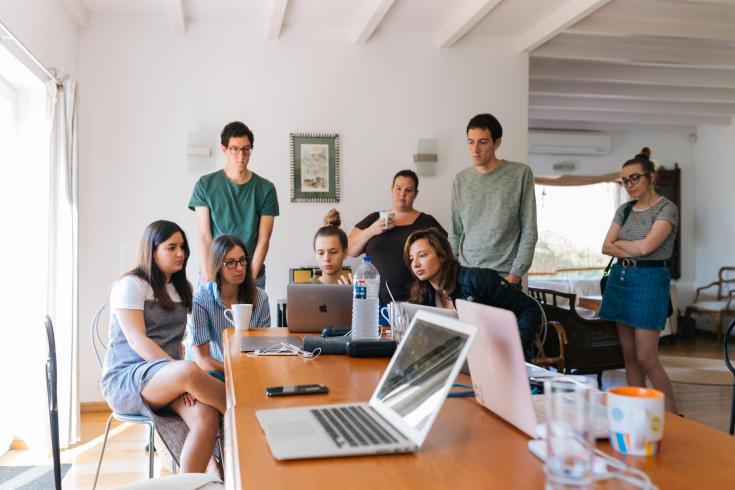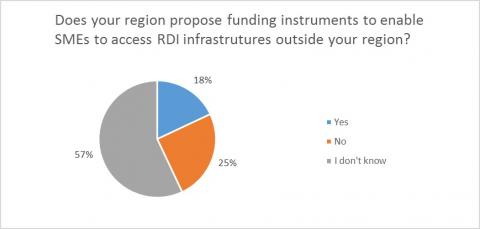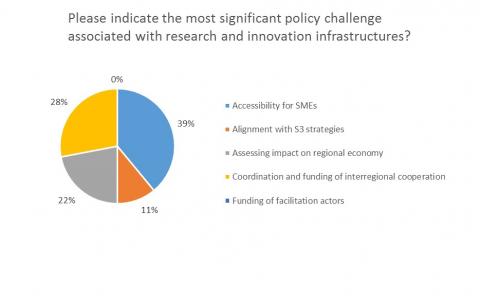Webinar on Improving access to Europe’s Research and innovation infrastructure

Bringing together more than 40 innovation experts and regional policymakers from all parts of Europe, an online thematic discussion on research and innovation was organised on 6 February. The focus of the webinar was: challenges for SMEs in accessing the knowledge and facilities of Europe’s research and innovation infrastructures.
The webinar was moderated by Thorsten Kohlisch, with interventions from the Policy Learning Platform thematic experts Marc Pattinson and Carl Arvid Dahlöf, and three invited speakers: Mr Yannis Ioannidis (Athena Research and Innovation Centre, University of Athens, Vice-Chair of the European Strategy Forum on Research Infrastructures - ESFRI), Mr Krišjānis Veitners (Vidzeme Planning Region, INNO INFRA SHARE project) and Mr Ari Lainevuo (Helsinki-Uusimaa Regional Council, BRIDGES project).
The webinar started by asking the audience to respond to a quick poll prior to the speaker presentations (see results below):

The results show that there are indeed regions already offering this kind of support, however there also appears to be many regions where these opportunities are not offered or not sufficiently known.
The first speaker, Mr Yannis Ioannidis, presented the perspective of the European Strategy Forum on Research Infrastructures (ESFRI), linking it to the Forum’s Roadmap 2018 on research infrastructures. His presentation is available
Mr Ioannidis distinguished between two forms of research infrastructure and industry cooperation: the upstream business model (technology transfer) and the downstream business model (knowledge transfer). In the former, 'co-solutions' on shared problems between scientific and industrial partners are an important component. Simplified public procurement processes and better use of EU-level policy instruments to include SMEs (as done successfully in the USA) were among the points of improvement highlighted. In the downstream model, industry benefits from the research infrastructure supplying basic and applied research, testing opportunities, and exchange programmes for training and mobility. The challenges include the financial costs of access, as well as managing intellectual property rights in joint research projects.
Lastly, Mr Ioannidis touched upon the topic of open access to research data and the potential to spur innovation. Three recommendations to strengthen access and collaboration around data were highlighted:
- an Industrial Liaison Office to act as broker between research infrastructure and industry;
- Industrial Data Platforms to provide framework for data governance;
- development of Quality stamps for infrastructure nodes.
Mr Krišjānis Veitners (INNO INFRA SHARE) turned the focus onto the transfer and implementation of good practices from Interreg Europe project partners with his
Mr Veitners provided insight into how the 'OpenLab Skåne' good practice (Skåne region, Sweden) was chosen for implementation for its potential to offer a 'simple' solution to these challenges. He also underlined the importance of working with an interregional partnership involving highly innovative regions and for the necessity to engage early with stakeholders’ in order to put in motion cultural and mindset adaptations and, consequently secure successful outcomes.
The third
In the follow-up discussion, Mr Lainevuo also touched upon the essential role offered by digitalisation to facilitate access and knowledge sharing, this is especially true in Finland where the ICT infrastructure is well-developed. The alignment with several regional policy priorities (internationalisation, SME support and commercialisation actions) also meant that the good practice was well suited to local conditions.
Wrapping up the webinar, the team of the Policy Learning Platform turned the attention of the audience to the current policy challenges (including access) associated with research and innovation infrastructures. A second poll asking the audience to identify the most significant challenges gave the following results:

In conclusion, the webinar confirmed the importance of a number of key messages:
- Working with SMEs and reinforcing their absorption capacities is a crucial aspect of a policy tool kit that aims to enhance linkages to RII in regions;
- Industrial Liaison or transfer officers (brokers) are key actors to facilitate access to RII but new business models and approaches are needed to respond to today’s challenges, such as the SME skills gaps, digitalisation, funding, etc;
- Interregional cooperation is a key component of regional competitiveness measures in support of SMEs utilising RII resources to progress along the Technology Readiness Levels (TRL) and value chains and explore cross sectoral collaboration with the support of enabling technologies;
- Stakeholder engagement and dedicated communication actions play an important part in the transfer and implementation (funding) of good practices;
- Strategic investments in RII need to be considered in a European perspective and explore cooperation opportunities via S3 Thematic Partnerships, H2020 and other mechanisms.
- Finally, interregional good practice transfers and sharing implementation experiences can help regions both adapt and adopt policies that have worked elsewhere and thus accelerate their innovation performance.
